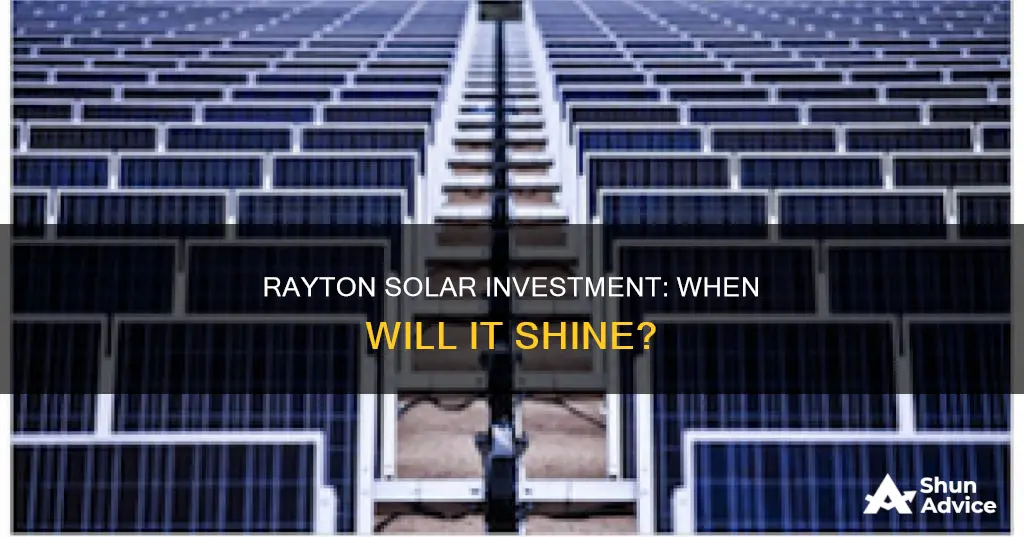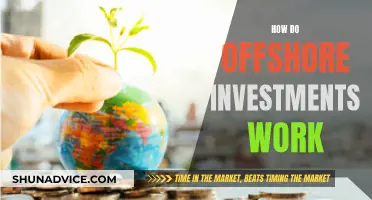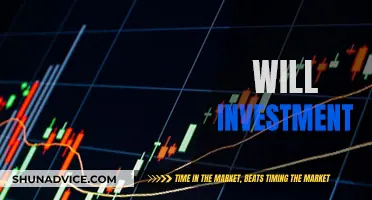
Rayton Solar, Inc. is a company that uses a proprietary technology to manufacture solar panels that are 60% cheaper and 25% more efficient than the market standard. The company was incorporated in 2013 and has been developing a photovoltaic (solar) panel manufacturing technology that will allow for solar energy panels to be manufactured at a fraction of the current cost.
Rayton Solar's founder, Andrew Yakub, is a particle beam physicist and clean technology entrepreneur who decided to take his unique perspective and create the most efficient solar panel with Rayton Solar. The company has been successful in manufacturing solar cells using a particle accelerator but is yet to modify the accelerator to produce solar cells at the rate of 150 per hour, which is the industry standard.
The company closed an investment round in April 2022 and is no longer accepting investments.
| Characteristics | Values |
|---|---|
| Offering start date | 13th January 2017 |
| Offering end date | 13th January 2018, or when the maximum offering amount has been sold, or when the offering is terminated by the company |
| Maximum offering amount | $50 million |
| Minimum investment size | $500 |
| Shares offered | 32,894,736 |
| Share price | $1.52 |
What You'll Learn

Rayton Solar's proprietary technology
Rayton Solar's technology is based on a particle accelerator that was co-engineered with Phoenix Nuclear Laboratory (PNL). The particle accelerator fires a beam of protons at a silicon ingot, creating a weakened boundary along a crystalline plane. A substrate is then attached to the silicon ingot, and a thin layer of silicon, referred to as a wafer, can be separated from the ingot. This process uses 50 to 100 times less silicon than the current industry standard method of cutting silicon with a diamond wire, which wastes half of the silicon processed.
Rayton Solar's process can slice silicon wafers to 3-micron thicknesses, allowing the use of float-zone silicon, the highest grade of silicon. The company has exclusive solar industry rights for the only particle accelerator capable of penetrating silicon at this level.
The company has also patented a silicon processing technique for ion implantation and exfoliation on silicon ingots, and an ion implantation using float-zone silicon.
The company's manufacturing process can yield 100 times the material of conventional methods. It has been awarded two patents for its semiconductor wafers and the processes required to manufacture them.
The Myth of Responsible Investing: Does Doing Good Pay Off?
You may want to see also

Rayton Solar's market competition
Rayton Solar's competitors include:
- First Solar
- Yingli Solar
- Jinko Solar
- SunEdison
- SunPower
- BSEnergy
- Risen Energy
- Nice Sun PV
- Unitech
- WenZhou Solar
February: A Month for Investing?
You may want to see also

Rayton Solar's funding and investment
Rayton Solar is a privately owned company that has developed a photovoltaic (solar) panel manufacturing technology that allows for solar energy panels to be manufactured at a fraction of the current manufacturing cost. The company was founded by Andrew Yakub, a particle beam physicist and clean technology entrepreneur, in 2013.
Funding
Rayton Solar has raised over $1 million in seed funding and has offered a maximum of 32,894,736 shares of Common Stock for $1.52 per share, including up to 1,973,682 shares of Common Stock sold by current security holders. The company's technology allows solar to be cost-competitive with fossil fuels without the need for government subsidies. Rayton's manufacturing process can yield 100 times the material of conventional methods and the company has been awarded two patents for its semiconductor wafers and the processes required to manufacture them.
Investment
Rayton Solar is backed by over 5,000 investors and is making history as one of the first democratically funded technology companies. The company is looking for investors to help develop a full proof-of-concept, which will allow them to begin marketing their product. Rayton Solar's goal is to bridge the gap between particle accelerator technology and solar energy production by creating a silicon processing technique that can produce solar modules that are less expensive and more efficient than products currently on the market. The company's technology is positioned to have a major impact in many industries.
The Debt Dilemma: Navigating the Path to Financial Freedom
You may want to see also

Rayton Solar's founder and CEO, Andrew Yakub
Yakub's idea for Rayton Solar came about when he realised the importance of reducing the costs of solar energy at a pivotal time in history. He gathered a team of expert scientists and serial entrepreneurs to bring his vision to life.
Yakub has been recognised for his work, being awarded a spot on Forbes' "30 under 30" list in 2016. He has also been recognised by Bill Nye, who stands behind Rayton Solar.
Yakub has raised millions in funding for Rayton Solar and has been working with the company to develop its technology and demonstrate how to make solar energy less expensive and more efficient. The company has also been working towards getting UL certification, which is required to sell solar panels in North America.
Yakub hopes that Rayton Solar's technology will enable solar panels to be manufactured at a significantly reduced cost, with better-than-industry-average margins, and with increased efficiency.
Understanding the Mechanics of Investment Dividend Payouts
You may want to see also

Rayton Solar's future plans
To achieve this, Rayton Solar is currently seeking investments to fund its Beta Phase of operations, where it will use commercial-grade, high-volume equipment to produce samples. The company has already received the world-class particle accelerator needed for this phase and is in the process of testing and commissioning the equipment. Rayton Solar estimates that it will take about 12 months to complete the Beta Phase and bring the company to a full proof-of-concept.
Following the Beta Phase, Rayton Solar plans to move into single-line production and then into a high-volume manufacturing phase. The company estimates that it will need about $14 million to get into the revenue phase, which is expected to generate approximately $9 million per year or 120,000 wafers per year. Rayton Solar also intends to diversify the applications of its products to strengthen its position in the market. While solar will remain a core product, the company will also target the semiconductor industry by creating lower-cost Gallium Arsenide wafers, which have a diverse range of applications, including automotive, aerospace, 5G, LED, and solar.
In summary, Rayton Solar's future plans involve completing its Beta Phase, moving into production, and diversifying its product offerings to expand its market reach. The company aims to revolutionize the solar energy market and impact multiple industries with its innovative technology.
Retirement Security: Is a Retirement Annuity a Smart Investment?
You may want to see also
Frequently asked questions
Rayton's investment round is currently live on StartEngine.
Rayton's investment round will end on the earlier of the following: 1) the date at which the maximum offering amount has been sold, 2) January 13, 2018, or 3) the date at which the offering is earlier terminated by the company in its sole discretion.
The minimum investment size is $500.
Rayton is offering a maximum of 32,894,736 shares of Common Stock on a “best efforts” basis without a minimum investment target.
Rayton will use the funds to develop and validate the company’s technology, to purchase certain assets to advance its plan to produce and market PV modules and for general corporate purposes.







